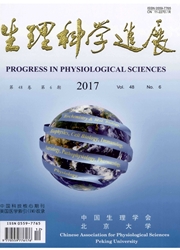

 中文摘要:
中文摘要:
目的:研究咖啡因对小鼠空间学习记忆能力以及有关脑区记忆相关蛋白——环腺苷酸应答元件结合蛋白(CREB)表达的影响。方法:C57BL/6J小鼠45只随机分成3组:咖啡因小剂量组(10mg·kg^-1)、咖啡因大剂量组(50mg·kg^-1)及生理盐水对照组,均腹腔给药。采用Morris水迷宫评价空间记忆能力及Western blot检测CREB的表达量。结果:与大剂量组及生理盐水对照组相比,咖啡因小剂量组定位航行实验逃避潜伏期显著缩短;空间搜索实验穿越原平台位置的次数显著增多;海马组织CREB表达显著增加。结论小剂量咖啡因能够提高小鼠空间学习记忆能力,且增加海马区CREB的表达。
 英文摘要:
英文摘要:
Aim: To investigate the effects of caffeine on spatial learning and memory in mice and to explore the molecular mechanism with the expression levels of cAMP-responsive element binding protein (CREB) in hippocampus and striatum. Methods: 45 male C57BL/6J mice were randomly assigned to 3 groups: caffeine(10 mg·kg^-1), caffeine(50 mg·kg^-1), and saline groups, each group n=15, and were administrated caffeine or saline by intraperitoneal injection right after the completion of the behavioral training : Morris water maze(MWM)performance was used to measure spatial memory in rats. Twenty-four h after behavioral testing, the mice were killed and brain are dissected for determining the expression levels of CREB protein in hippocampus and striatum tissues by Western blotting. Results : The mice treated with caffeine at the low dose (10 mg·kg^-1) significantly decreased the escape latencies and increased the times of crossing the exact position of the former platform in MWM, compared to the mice treated with saline. In contrast, treatment with high doses of caffeine (50 mg·kg^-1) was not effective in improving behavioral performance in MWM test. The levels of CREB in hippocampus tissues of mice were significantly increased in the mice treated with the low dose (but not high dose) of caffeine compared to the saline-treated mice, however there was no significant difference in striatum CREB levels between the caffeine (low or high dose) treated mice and saline-treated mice. Conclusion : The non-selective adenosine receptor antagonist caffeine at the low dose (but not high dose) enhanced spatial memory of mice in MWM. The molecular mechanisms of caffeine improving the spatial memory may be related to increasing the levels of CREB in hippocampus tissues of mice.
 同期刊论文项目
同期刊论文项目
 同项目期刊论文
同项目期刊论文
 期刊信息
期刊信息
